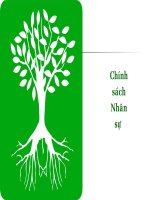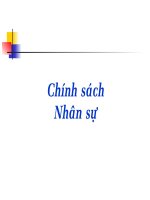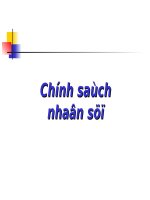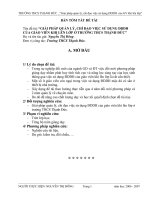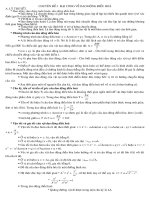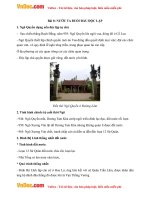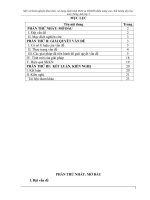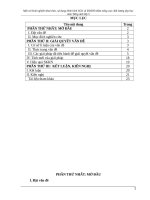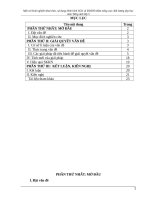DDDH SGK buổi 4
Bạn đang xem bản rút gọn của tài liệu. Xem và tải ngay bản đầy đủ của tài liệu tại đây (306.16 KB, 4 trang )
PRO 3M/3MPLUS – ƠN LUYỆN TỒN DIỆN CHO KÌ THI TỐT NGHIỆP THPT QUỐC GIA
Biên soạn: Cô Vũ Thị Mai Phương – Ngoaingu24h.vn
TÀI LIỆU ĐI KÈM LIVESTREAM
LUYỆN ĐỌC ĐIỀN - ĐỌC HIỂU ( BUỔI 4)
Theo dõi LIVESTREAM ĐỘC QUYỀN của cơ vào lúc
20h30 ngày 3/10 duy nhất trên khóa học PRO 3MPLUS
Cô Vũ Thị Mai Phương
ai
:T
ge
Pa
Read the following passage and mark the letter A, B, C or D to indicate the correct word or phrase that
best fits each of the numbered blanks.
Millions of people are using cellphones today. In many places, it is actually considered unusual not to
use one. In many countries, cellphones are very popular with young people. They find that the phones are
more than a means of communication - having a mobile phone shows that they are cool and connected.
The explosion in mobile phone use around the world has made some health professional worried. Some
doctors are concerned that in the future many people may suffer health problems from the use of mobile
phones. In England, there has been a serious debate about this issue. Mobile phone companies are worried
about the negative publicity of such ideas. They say that there is no proof that mobile phones are bad for
your health.
On the other hand, medical studies have shown changes in the brain cells of some people who use
mobile phones. Signs of change in the tissues of the brain and head can be detected with modern scanning
equipment. In one case, a traveling salesman had to retire at young age because of serious memory loss.
He couldn't remember even simple tasks. He would often forget the name of his own son. This man used
to talk on his mobile phone for about six hours a day, every day of his working week, for a couple of
years. His family doctor blamed his mobile phone use, but his employer's doctor didn't agree.
What is it that makes mobile phones potentially harmful? The answer is radiation. High-tech machines
can detect very small amounts of radiation from mobile phones. Mobile phone companies agree that there
is some radiation, but they say the amount is too small to worry about. As the discussion about their safety
continues, it appears that it's best to use mobile phones less often.
Question 1. The most suitable title for the passage could be _____________.
A. Technological Innovations and Their Price
B. The Importance of Mobile Phones
C. Mobile Phones: A Must of Our Time
D. Advantages and Disadvantages of Mobile Phones
Question 2. According to the passage, cellphones are especially popular with the youth because ____.
A. they keep the users in alert all the time
B. they are integral in daily communication
C. they are the only effective means of communication
D. they make them look more stylish
Question 3. According to the passage, the changes possibly caused by the cellphones are mainly
concerned with _________.
A. the smallest units of the brain
B. the central unit of the brain
C. the structure of the brain
D. the long-term memory
eu
Li
K
a
ho
ay
H
oc
H
n
ie
M
im
iK
Ph
an
V
KHÓA HỌC PRO3M/PRO3MPLUS – CHINH PHỤC ĐIỂM 9+ MÔN TIẾNG ANH CÙNG CÔ VŨ MAI PHƯƠNG
PRO 3M/3MPLUS – ƠN LUYỆN TỒN DIỆN CHO KÌ THI TỐT NGHIỆP THPT QUỐC GIA
Biên soạn: Cô Vũ Thị Mai Phương – Ngoaingu24h.vn
Question 4. The words “negative publicity” in paragraph 2 most likely means ________.
A. information on the lethal effects of cellphones
B. the negative public use of cellphones
C. widespread opinion about bad effects of cellphones
D. constructive ideas about the effects of cellphones
Question 5. The word “their” in the last paragraph refers to ________.
A. mobile phone companies B. mobile phones
C. high-tech machines
D. radiations
ai
:T
ge
Pa
Read the following passage and mark the letter A, B, C or D to indicate the correct answer to each of
the questions.
REALITY TELEVISION
Reality, television is a genre of television programming which, it is claimed, presents unscripted
dramatic or humourous situations, documents actual events and features ordinary people rather than
professional actors. It could be described as a form of artificial or "heightened" documentary. Although
the genre has existed in some form or another since the early year of television, the current explosion of
popularity dates from around 2000.
Reality television covers a wide range of television programming formats, from games to quiz shows
which resemble the frantic, often demeaning programmes produced in Japan in the 1980s and 1990s (a
modern example is Gaki no Tsukai), to surveillance - or voyeurism - focused production such as Big
Brother.
Critics say that the term "reality television” is somewhat of a misnomer and that such shows frequently
portray a modified and highly influenced form of reality, with participants put in exotic locations or
abnormal situations, sometimes coach to act in certain ways by off-screen handlers, and with events on
screen manipulated through editing and other post-production techniques.
Part of reality television's appeal is due to its ability to place ordinary people in extraordinary
situations. For example, on the ABC show, The Bachelor, an eligible male dates a dozen women
simultaneously, travelling on extraordinary dates to scenic locales. Reality television also has the potential
to turn its participants into national celebrities, outwardly in talent and performance programs such as Pop
Idol, though frequently Survivor and Big Brother participants also reach some degree of celebrity.
Some commentators have said that the name "reality television" is an inaccurate description of several
styles of program included in the genre. In competition-based programs such as Big Brother and Survivor,
and other special-living-environment shows like the Real World, the producers design the format of the
show and control the day-to-day activities and the environment, creating a completely fabricated world
in which the competition plays out. Producers specifically select the participants, and use carefully
designed scenarios, challenges, events, and settings to encourage particular behaviours and conflicts.
Mark Burnett, creator of Survivor and other reality shows, has agreed with this assessment, and avoids
the word "reality” to describe his shows; he has said, "I tell good stories. It really is not reality TV. It
really is unscripted drama."
Question 1. In the first line, the writer says “it is claimed” because ___________.
A. he wants to distance himself from the statement
B. he totally disagrees with the statement
C. everybody except the writer agrees with the statement
D. he wants to emphasize that it is his own claim
Question 2. The word “demeaning” in paragraph 2 is closest in meaning to __________.
A. valueless
B. humiliating
C. despising
D. diminishing
eu
Li
K
a
ho
ay
H
oc
H
n
ie
M
im
iK
Ph
an
V
KHÓA HỌC PRO3M/PRO3MPLUS – CHINH PHỤC ĐIỂM 9+ MÔN TIẾNG ANH CÙNG CÔ VŨ MAI PHƯƠNG
PRO 3M/3MPLUS – ƠN LUYỆN TỒN DIỆN CHO KÌ THI TỐT NGHIỆP THPT QUỐC GIA
Biên soạn: Cô Vũ Thị Mai Phương – Ngoaingu24h.vn
ai
:T
ge
Pa
Question 3. According to the passage, Reality TV appeals to some because ___________.
A. it uses exotic locations
B. it shows eligible men dating women
C. it can turn ordinary people into celebrities
D. it shows average people in exceptional circumstances
Question 4. According to the passage, the program “Pop Idol” __________.
A. is more likely to turn its participants into celebrities than Big Brother
B. turns all participants into celebrities
C. is a dating show
D. is less likely to turn participants into celebrities than Big Brother
Question 5. Producers choose the participants _____________.
A. to make an imaginary world
B. on the ground of talent
C. to create conflict among other things
D. only for special-living-environment shows
Question 6. The term “reality television” is inaccurate _____________.
A. for talent and performance programs
B. for special-living-environment program
C. for all programs
D. for Big Brother and Survivor
Question 7. The word “fabricated” in paragraph 5 is closest in meaning to ________.
A. real
B. imaginative
C. imaginary
D. isolated
Question 8. Which of the following in NOT true according to the passage?
A. Shows like Survivor have good narratives.
B. Mark Burnett thinks the term "reality television” is inaccurate.
C. Reality television has been popular since well before 2000.
D. Japan has produced demeaning TV shows copied elsewhere.
Read the following passage and mark the letter A, B, C or D to indicate the correct word or phrase that
best fits each of the numbered blanks.
A POWERFUL INFLUENCE
There can be no doubt (1) ________ that the Internet has made a huge difference to our lives. Parents
are worried that children spend too much time playing on the Internet, hardly (2) ________ doing anything
else in their spare time. Naturally, parents are (3) ________ to find out why the Internet is so attractive,
and they want to know if it can be harmful for their children. Should parents worry if their children are
spending that much time (4) _________ their computers?
Obviously, if children are bent over their computers for hours, (5) _________ in some game, instead
of doing their homework, then soothing is wrong. Parents and children could decide how much use the
child should (6) _________ of the Internet, and the child should give his or her (7) ________ that it won't
interfere with homework. If the child is not (8) _________ to this arrangement, the parents can take more
drastic steps. (9) _________ with a child's use of the Internet is not much different from negotiating any
other sort of bargain about behavior.
Any parent who is seriously alarmed about a child's behavior should make an appointment to discuss
the matter with a teacher. Spending time in front of the screen does not (10) _________ affect a child's
performance at school. Even if a child is (11) _________ crazy about using the Internet, he or she is
probably just (12) _________ through a phase, and in a few months there will be something else to worry
about!
eu
Li
K
a
ho
ay
H
oc
H
n
ie
M
im
iK
Ph
an
V
KHÓA HỌC PRO3M/PRO3MPLUS – CHINH PHỤC ĐIỂM 9+ MÔN TIẾNG ANH CÙNG CÔ VŨ MAI PHƯƠNG
PRO 3M/3MPLUS – ƠN LUYỆN TỒN DIỆN CHO KÌ THI TỐT NGHIỆP THPT QUỐC GIA
Biên soạn: Cô Vũ Thị Mai Phương – Ngoaingu24h.vn
A. at least
A. ever
A. reluctant
A. watching
A. puzzled
A. cause
A. word
A. holding
A. Agreeing
A. possibly
A. absolutely
A. going
B. at all
B. rarely
B. concerned
B. glancing at
B. absorbed
B. take
B. promise
B. seeing
B. Dealing
B. unlikely
B. more
B. experiencing
C. at length
C. never
C. curious
C. glimpsing at
C. interested
C. make
C. vow
C. following
C. Talking
C. probably
C. enough
C. travelling
D. at most
D. always
D. hopeful
D. staring at
D. occupied
D. create
D. claim
D. accepting
D. Complaining
D. necessarily
D. a lot
D. walking
ai
:T
ge
Pa
Question 1.
Question 2.
Question 3.
Question 4.
Question 5.
Question 6.
Question 7.
Question 8.
Question 9.
Question 10.
Question 11.
Question 12.
eu
Li
K
a
ho
ay
H
oc
H
n
ie
M
im
iK
Ph
an
V
KHĨA HỌC PRO3M/PRO3MPLUS – CHINH PHỤC ĐIỂM 9+ MƠN TIẾNG ANH CÙNG CÔ VŨ MAI PHƯƠNG
